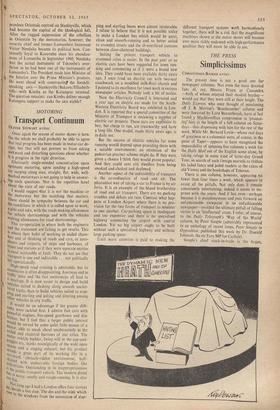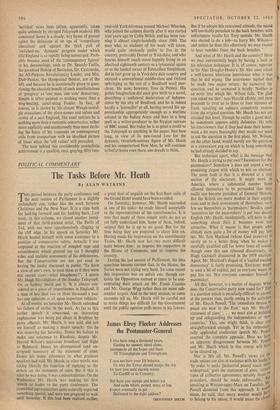THE PRESS
Simplicissimus
CHRISTOPHER BOOKER writes: The present time is not a good one for newspaper columns. Not even the most devoted fans of, say, Messrs. Frayn or Cassandra —both of whom enjoyed their modish heyday— would say,that they were still at their height. The Daily Express, who once thought of pensioning off J. B. Morton's 'Beachcomber' column and were thwarted by Lord Beaverbrook, have at last found, a Machiavellian compromise in 'promot- ing'.him to the length of a full column on Satur- days—thus dispensing with him for the rest of the week. While Mr. Bernard Levin—whose real days of greatness as a columnist were, of course, in the guise of Taper—appears to have recognised the impossibility of spinning five columns a week for the Daily Mail out of the English scene alone, by taking refuge in some kind of latter-day Grand Tour, •in search of such foreign marvels to titillate his jaded fancy and jaded readers as the cakes of old Vienna and the bookshops of Teheran.
There is one column, however, appearing no fewer than four times a week, which appears to avoid all the pitfalls. Not only does it remain consistently entertaining; indeed it seems to im- prove with the years. And it has even—perhaps because it is pseudonymous and puts forward an unfashionable viewpoint in an unfashionable newspaper—avoided the ultimate pitfall of falling victim to an 'intellectual' craze. I refer, of course, to the Daily Telegraph's 'Way of the World' column, by Peter Simple (admirably represented in an anthology of recent items, Peter Simple in Opposition, published this week by Dr. Donald Johnson, the ex-Tory MP for Carlisle).
Simple's chief stock-in-trade is the bogus,
'satirical' news item (often, apparently, taken quite seriously by enraged Telegraph readers). His consistent theme is a steady, wry hymn of protest aginst the delusions of an age of 'compulsory liberalism' and against the thick pall of `switched-on,' dynamic' progress under which Old England is so rapidly being submerged. Prob- ably because most of the 'contemporary figures' in his demonology, such as Dr. Spacely-Trellis, the go-ahead Bishop of Bevindon, Dr. Castrumba, the All-Purpose Revolutionary Leader, and Mrs. Dutt-Pauker, the Hampstead thinker, are of the left, and because he is occasionally given to ques- tioning the absolute benefit of such manifestations of 'progress' as 'one man, one vote' democracy, Simple is often painted as nothing more than a wog-beating, canal-using Fascist. In fact, of course, as is shown by his almost Waugh-nostal- gic evocations of the place-names and values and mores of a past England, like most satirists he is nothing more than a romantic conservative, rather more explicitly and unashamedly than most deriv- ing the force of his comment on contemporary evils from comparison with an idealised picture of times when the 'old values' still prevailed.
The man behind this considerable journalistic achievement is a smallish, neat, greying, fifty-two-
year-old Yorkshireman named Michael Wharton, who joined the column shortly after it was started nine years ago by Colin Welch, and has been run- ning it almost single-handedly since 1960. The man who, as students of his work will know, would quite obviously prefer to live in the country, preferably Dorset or Yorkshire, and who fancies himself much more happily living in an idealised eighteenth century as a tyrannical squire or as the landed owner of Edwardian Simpleham, did in fact grow up in Yorkshire dale country and enjoyed a conventional middle-class and Oxford upbringing as the son of a Bradford wool mer- chant. He now, however, lives in Putney. His gothic imagination did once give birth to a novel, describing a unilateral declaration of indepen- dence by the city of Bradford, and he is indeed hardly a 'journalist' at all, having served his ap- prenticeship appropriately enough as a wartime colonel in the Indian Army and then in a long spell as a writer-producer in the Stygian recesses of BBC sound. But today he is as great a credit to the Telegraph as anything in the paper. Just how long, in view of its new-found love for the dynamic, twentieth-century figure of Mr. Heath and his computerised New Men, he will continue to feel at home even there, one dreads to think.































 Previous page
Previous page